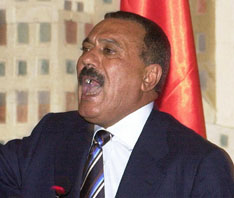Yemen president will step down at next election
President Ali Abdullah Saleh of Yemen has announced that he will not attempt to extend his presidency; a move which would end his three-decade tenure when his current term expires in 2013.

Following mass public uprisings and social unrest in Tunisia and Egypt – which have resulted in the ousting of Ben Ali and threatens a similar outcome to Egypt’s President Hosni Mubarak – Saleh also insisted he would not transfer power to his son.
“No extension, no inheritance, no resetting the clock,” Saleh said, speaking ahead of a planned large rally due on Thursday in Sanaa that has been dubbed a “Day of rage.”
The announcement means Saleh becomes the third Arab leader this year to announce their resignation due to huge street protests calling for democratic reforms.
Will protests have domino effect in Arab world?
Activists and opposition supporters have staged several protests in Sanaa, demanding Saleh’s removal and venting their fury at rumours he plans to install his son in power. The opposition has called for mass anti-Saleh rallies for Thursday in all provinces.
Mr Saleh’s move to amend the constitution so he can be president for life has enraged Yemenis, citizens of the poorest country in the Arab world.
His attempts at reform have so far failed to satisfy the opposition.
On Monday, he increased wages and reduced income taxes and ordered the creation of a fund to employ university graduates and to extend social security coverage.
Mr Saleh also exempted university students from the rest of their tuition fees for this academic year, and charged the high council of universities to reduce the cost of a degree.